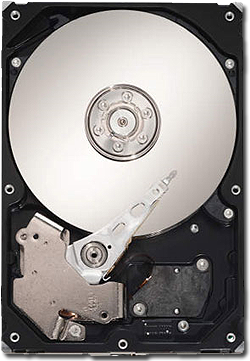Seagate First With SATA 6Gb/sec. 2 TB Drive
Seagate today started shipments of the Barracuda XT, which boasts the fastest SATA connection yet.
The Barracuda XT is a 7200 RPM 3.5-inch hard drive featuring 2 TB of storage capacity and a SATA 6 Gb/sec. interface.
"Capacity and performance remain the defining attributes of hard drives for PC gamers, digital multimedia content developers and many other customers requiring high-end systems at home and in the office," said Dave Mosley, executive vice president of Sales and Marketing at Seagate. "Seagate is meeting these requirements with the first 7200 RPM desktop hard drive to combine 2 TB of storage capacity with the fastest Serial ATA interface to date."
Of course, before you go blazing off with a SATA 6 Gb/sec. drive, you're going to need a motherboard that supports it. Right now, such boards aren't yet commonplace, but right now options include Asus' P7P55D Premium and Gigabyte's P55 series GA-P55-Extreme motherboards.
Get Tom's Hardware's best news and in-depth reviews, straight to your inbox.
-
xaira until seagate starts releasing ssds, they can keep sata 6g to themselves, burst rates will improve, but thats about itReply -
tester24 I can say for a fact that going to a 6 gig drive is a major improvement overall past a 3 gig and you don't have the high cost low capacity of an SSD. I used to QA testing for a company that makes 6 gig HBAs. Sure SSD will be faster but for the cost of 1 SSD you could probably buy 2 or 3 6 gig drives and RAID them so you have way more storage and top speed. Drive speeds are not just in the burst rates but over double the performance you get between 3 gig drives.Reply -
tester24 njkid3until they can release a drive that doesnt run hot i wouldnt go near them.Only the 10k and 15k drives run that hot. 7200 should be around the same temperature. Even the 3Gb 15k drives run hot so that wasn't a big surprise from the articleReply
-
tester24 Err I should have said the 7200 RPM drives should be about the same temperature as your 3Gb ones.Reply
-
cletus_slackjawd I would rather have hard drive manufactures build more reliable drives rather than continually releasing pre-mature, untested high capacity drives. They should make a product line that has passed the highest of standards of Q&A, identify the product as such, and see if it works from a marketing standpoint. I know there are many like me who would rather have rock solid reliablity than risk loosing valuable data for a drive the was built primarily for speed.Reply -
tester24 I know what you mean Cletus, but it's almost impossible to do that especially after you are banking alot of money on a product and want it shipped out the door to recoup the cost of R and D. That being said new technology like this has been available to 3rd party manufacturers for months now and they also test their products with these drives and give feedback on it. However the thousands of drives that are used to test this isn't a scratch on the millions of drives that will be sold. So unfortunately out of those millions a few might be inconvenienced on having a bad drive. But then again I've seen $600 top of the line SAS drives go bad so nothing is ever perfect.Reply -
matt87_50 http://www.tomshardware.com/reviews/2tb-hdd-caviar,2261-7.htmlReply
so drives are struggling to saturate the bandwidth of sata 1, let alone sata 2.
atleast sata2 added NCQ.
sata 3 for this drive is just a marketing gimmick.
also the article is misleading at the end, are they saying sata 3 is NOT backwards compatible? are they saying this drive won't work plugged into an sata 2 or 1 port?? I doubt it.
Cletus_slackjawdI would rather have hard drive manufactures build more reliable drives rather than continually releasing pre-mature, untested high capacity drives. They should make a product line that has passed the highest of standards of Q&A, identify the product as such, and see if it works from a marketing standpoint. I know there are many like me who would rather have rock solid reliablity than risk loosing valuable data for a drive the was built primarily for speed.
They do, they are called "raid editions" or "enterprise class", or "surveillance"
also, drive reliability is fairly unimportant. I mean, I don't care if the drive has a 10% chance of failing, or a 0.1%, as long as there is a chance, I'm still going to have everything backed up. (within reason of course, I'd still want atleast 3 years warranty). Having said that, I agree that all the gay firmware issues popping up lately are inexcusable.

